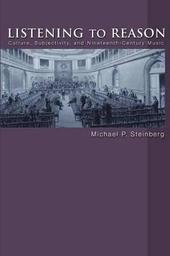
|
Listening to Reason: Culture, Subjectivity, and Nineteenth-Century Music
Paperback / softback
Main Details
| Title |
Listening to Reason: Culture, Subjectivity, and Nineteenth-Century Music
|
| Authors and Contributors |
By (author) Michael P. Steinberg
|
| Physical Properties |
| Format:Paperback / softback | | Pages:264 | | Dimensions(mm): Height 235,Width 152 |
|
| Category/Genre | Theory of music and musicology
Classical music (c 1750 to c 1830)
Romantic music (c 1830 to c 1900) |
|---|
| ISBN/Barcode |
9780691126166
|
| Classifications | Dewey:780.9034 |
|---|
| Audience | | Professional & Vocational | | Tertiary Education (US: College) | |
|---|
| Illustrations |
8 halftones.
|
|
Publishing Details |
| Publisher |
Princeton University Press
|
| Imprint |
Princeton University Press
|
| Publication Date |
2 April 2006 |
| Publication Country |
United States
|
Description
This pathbreaking work reveals the pivotal role of music--musical works and musical culture--in debates about society, self, and culture that forged European modernity through the "long nineteenth century." Michael Steinberg argues that, from the late 1700s to the early 1900s, music not only reflected but also embodied modern subjectivity as it increasingly engaged and criticized old regimes of power, belief, and representation. His purview ranges from Mozart to Mahler, and from the sacred to the secular, including opera as well as symphonic and solo instrumental music. Defining subjectivity as the experience rather than the position of the "I," Steinberg argues that music's embodiment of subjectivity involved its apparent capacity to "listen" to itself, its past, its desires. Nineteenth-century music, in particular music from a north German Protestant sphere, inspired introspection in a way that the music and art of previous periods, notably the Catholic baroque with its emphasis on the visual, did not.The book analyzes musical subjectivity initially from Mozart through Mendelssohn, then seeks it, in its central chapter, in those aspects of Wagner that contradict his own ideological imperialism, before finally uncovering its survival in the post-Wagnerian recovery from musical and other ideologies. Engagingly written yet theoretically sophisticated, Listening to Reason represents a startlingly original corrective to cultural history's long-standing inhibition to engage with music while presenting a powerful alternative vision of the modern.
Author Biography
Michael P. Steinberg is Professor of History and Music, and Inaugural Director of the Cogut Center for the Humanities at Brown University. He is Associate Editor of "The Musical Quarterly" as well as author of "Austria as Theater and Ideology: The Meaning of the Salzburg Festival", which won Austria's Victor Adler Prize for History in 2001. He is also the recipient of the Berlin Prize and a Guggenheim Fellowship.
Reviews"[Steinberg's] analyses--music not as closed art form but as permeable cultural phenomenon--elicit some fruitful and unexpected results... [A] deeply rewarding book."--Peter Quinn, Times Literary Supplement "Michael P. Steinberg's subject is the vast change that came over music in the 19th century, from something couched in public terms--religious or ceremonial--to something that feels essentially private, even when it happens in public. It's a familiar idea, but what makes this book original is the way he complicates it with other historical currents."--Ivan Hewett, BBC Music Magazine "With Listening to Reason: Culture, Subjectivity, and NIneteenth-Century Music, Michael P. Steinberg offers a provocative, intermittently brilliant rooting of nineteenth-century music ... in contemporaneous cultural and intellectual history. Few major German composers of the era go unexamined, and few readers are likely to walk away from the book with their understanding of this repertoire, and the culture from and for which it speaks, unrevised."--Peter Mercer-Taylor, Notes "Listening to Reason is a work of high integrity; it has a great deal to teach. Indeed, it's a book of importance."--Richard Leppert, Beethoven Forum "Michael P. Steinberg has not only made a simultaneous contribution to the fields of cultural history and musicology, he has authoritatively illustrated the importance of their interaction, or the close connection between the questions, theoretical approaches, and methodologies with which they are mutually engaged... Steinberg has made a truly major contribution to our understanding of how musical meaning, values, and creativity in the Austro German sphere were intertwined with the ambient ideological and political tensions."--Jane F. Fulcher, Journal of Modern History
|